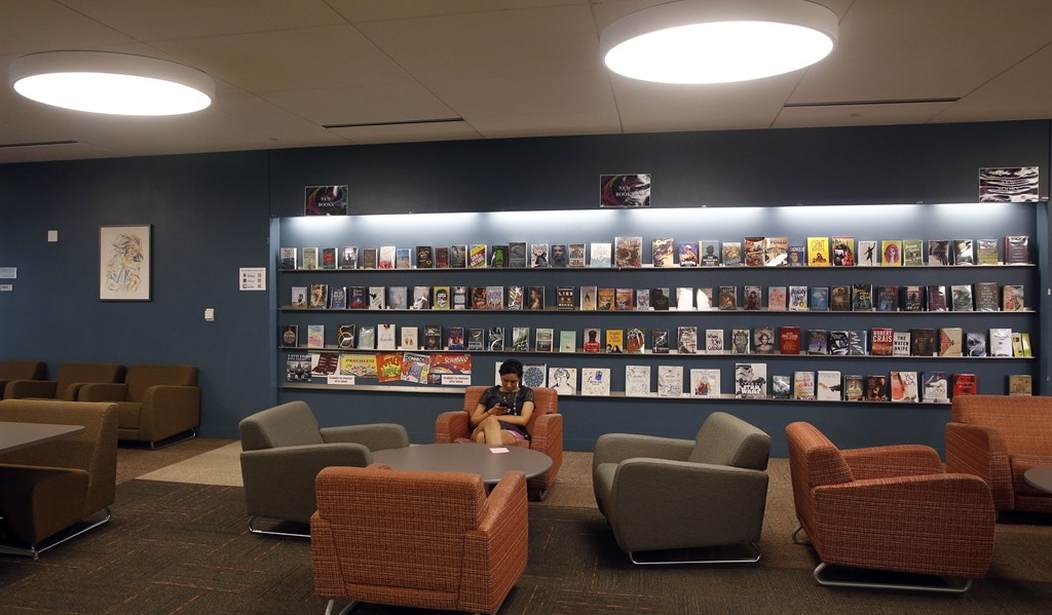Florida’s public schools have become a flashpoint in the ongoing nationwide power struggle between the public and a ruling class of self-appointed government experts and multinational corporations. The nation’s biggest publishers are suing Florida to force school districts to keep their books in the libraries of the state’s public schools.
Among the plaintiffs are Penguin Random House, Hachette Book Group, Macmillan Publishers, Simon & Schuster, and HarperCollins, who together control much of the U.S. publishing industry. (Disclosure: I was a book editor for Macmillan for about a year earlier in my career.)
HB 1069, signed into law last year by Gov. Ron DeSantis, gives Florida parents and taxpayers a say in some major issues that have arisen in the state’s government-run schools.
The new law sets standards for public schools’ teaching about human reproduction, bans “classroom instruction on sexual orientation or gender identity [in] prekindergarten through grade 8” in those schools, and “prohibits district school boards from imposing or enforcing requirements” that children be referred to by “pronouns that do not correspond with biological sex as defined in the bill, subject to specified exceptions,” the law states.
In addition to the provisions mentioned above, the law “requires the suspension of materials alleged to contain pornography or obscene depictions of sexual conduct, as identified in current law, pending resolution of an objection to the material,” the official bill summary states. “A district school board must also discontinue the use of any material the board does not allow a parent to read aloud.” That could lead to book removals or very spicy meetings.
This provision gives parents and taxpayers the right to question the inclusion of specific books in the libraries of their local government-run schools. Local school districts must create a process for such complaints and resolve them. It is ironic that people are complaining so fiercely about a law that ensures people’s right to complain.
The Florida law directs school boards to listen to the people who pay for the schools and whose children attend them. Naturally, this sensible decision sparked a furor among leftists across the country. The mainstream media, led as always by The New York Times, are calling the Florida process a “book ban.”
Florida should sue them all for libel. The law does not ban any books. “Books may be restored if a district determines that they are free of pornographic material,” The Wall Street Journal reports. “Non-pornographic materials containing descriptions or depictions of ‘sexual conduct’ can stay on shelves but are subject to grade or age restrictions.”
That is nothing like book banning. The new law merely puts public school libraries explicitly under the authority of the local school district, which, of course, they should be.
Anybody can run for their local school board, however, which means that people who have not been brainwashed—excuse me, enlightened—in college teacher-training programs might get a chance to decide what some Florida children will run across in their school libraries. The suit complains that Florida’s law requires books to be removed without consulting “trained professionals, such as teachers or media specialists.”
It’s interesting to ponder what kind of person thinks you need an education degree to be able to decide whether to use taxpayer money for copies of Gender Queer and other supposed classics of literature so that eight-year-olds can puzzle over drawings depicting sex acts.
The people behind the lawsuit claim Florida schools are taking classic books such as War and Peace and A Tale of Two Cities off the shelves. I cannot see why that is a problem: any nine-year-old smart enough to get something out of War and Peace is surely more than clever enough to get his or her hands on a copy.
That is obviously just a desperate scare story. The real complaint about lack of access is leftists’ frustration at being denied another entry point into the minds of Florida children who happen to be lucky enough to live in school districts with rational parents and conscientious school board members. The law does nothing to prevent children from reading whatever strikes their fancy. Proponents of the law are only saying some items should not be in the school library, which they happen to be paying for.
In addition, parents and taxpayers do, in fact, have a right to complain about others’ children being given access to certain books in government-run schools. What other people read (and listen to, and watch, and play, etc.) affects us through its effect on them. That does not justify government censorship of what adults can publish and sell to one another, but it does place the government in a position of responsibility toward children in its schools, and it obligates school staff to exercise good judgment in what they make available to children.
The only people who have a right to decide what books get into Florida’s government-school libraries are the people of Florida. Publishers have no “right” to have other people be forced to buy their books or even put them on public shelves if provided for free. Florida’s new law puts the authority over library holdings where it belongs: with the people and the school-district leaders they elect.
Other states would do well to take a leaf out of that book.
S. T. Karnick (https://stkarnick.substack.com/) is a senior fellow at The Heartland Institute and author of the Life, Liberty, Property weekly e-newsletter.














Join the conversation as a VIP Member